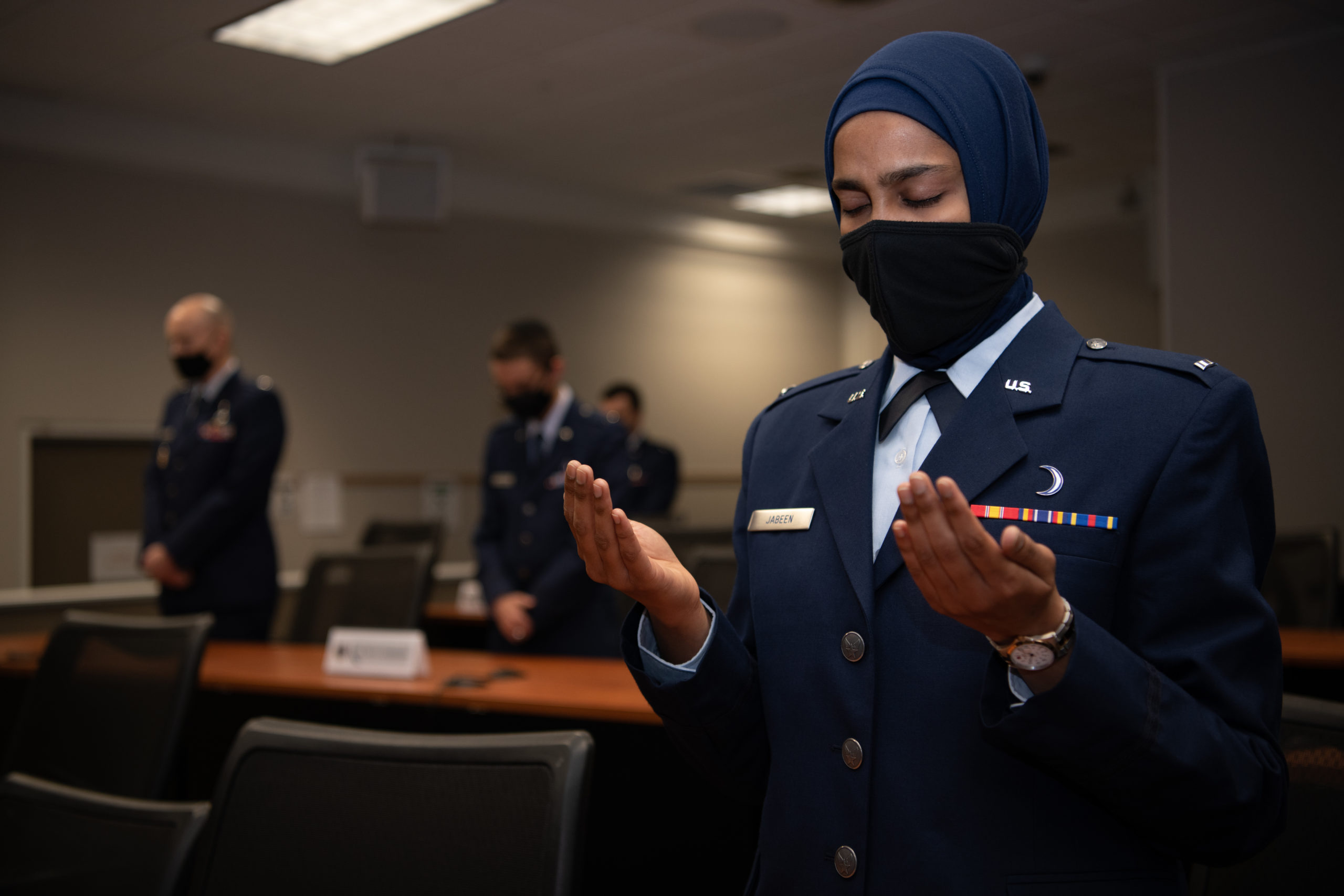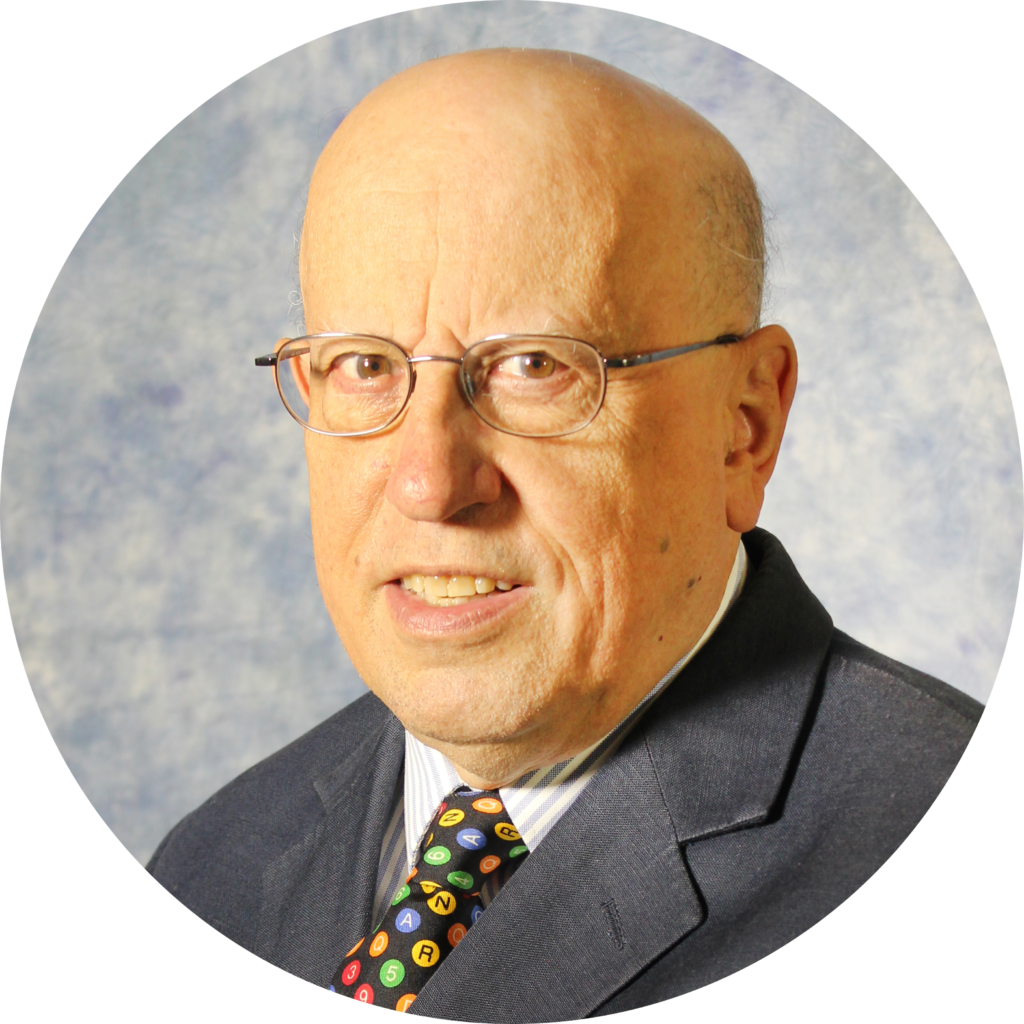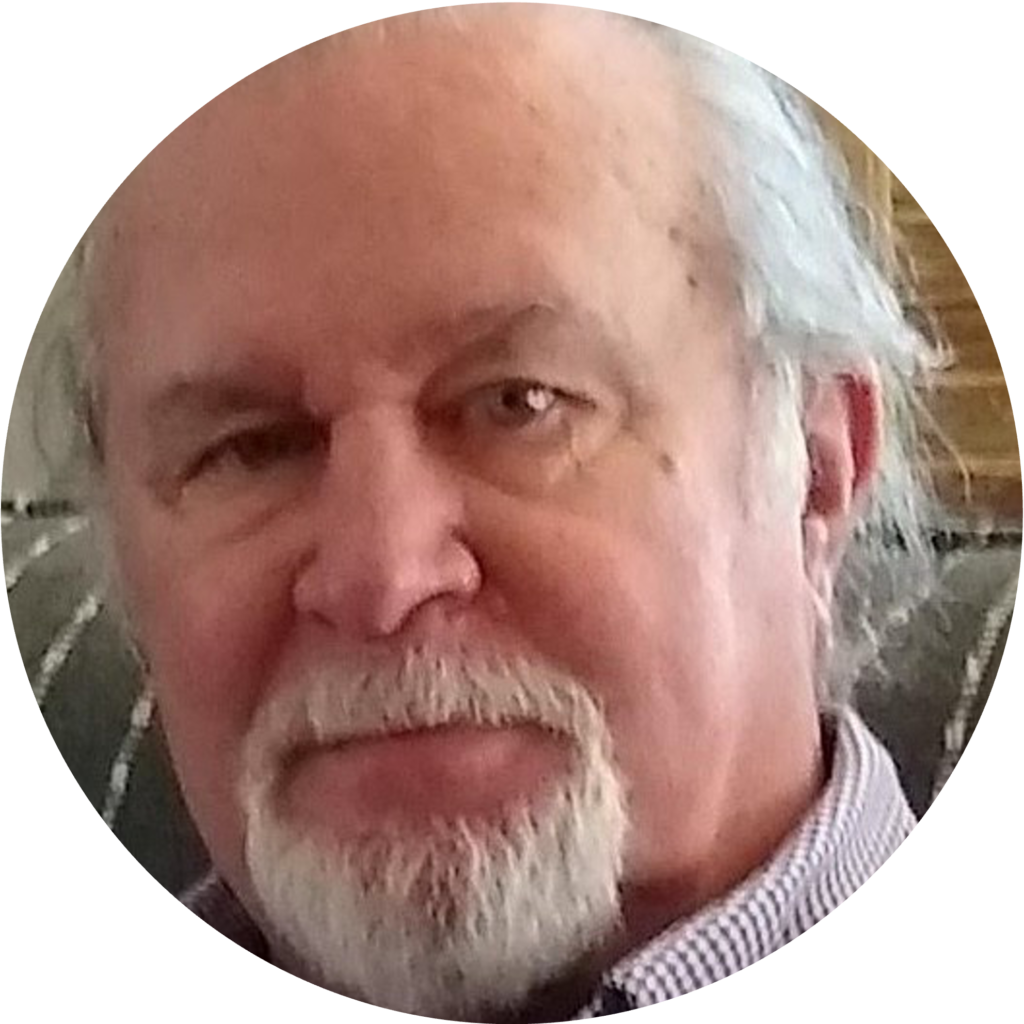
Chaplains: Indispensable Members of the Military
Charles J. Russo & John C. Mosbey
“First Female Muslim Chaplain, 2021” by Airman 1st Class Jackson Manske (CC0).
Senator John Boozman (R-AR) and Senator Raphael Warnock (D-GA) recently sponsored the Chaplains Memorial Preservation Act, authorizing the National Conference on Ministry to the Armed Forces to update the Protestant, Catholic, and Jewish chaplains’ memorials at Arlington National Cemetery to recognize those who died in the line of duty. As Senator Boozman observed,
Arlington National Cemetery is a sacred place honoring the sacrifices of the men and women who wore our nation’s uniform. Memorializing the chaplains who gave their lives in support of their country and dedicated themselves to ministering to their brothers and sisters in arms by etching their names into monuments on the Chaplains Hill symbolizes our deep appreciation for their heroism and bravery.
And as Senator Warnock remarked,
Military chaplains who have made the ultimate sacrifice in defense of our freedoms deserve a final resting place that honors all the parts of their service, both to our country and to the souls of their fellow servicemembers. I am proud to stand with countless veterans and clergy who’ve long worked to advance this important conversation, and I am proud to introduce bipartisan legislation with Senator Boozman to memorialize these brave chaplains who gave their lives for our country. This legislation is the least Congress can do properly to honor the calling of these military chaplains, and their commitment to serve a mission greater than themselves.
Regrettably, the bill has not yet been enacted into law.
This essay reflects on the status of chaplains, considering whether their presence is desirable, necessary, germane, or even constitutionally permissible, given the ongoing debate on the role, if any, of religion in greater American society, let alone in the military. We conclude that it is in the best interest of the nation for civilian and military leaders to continue to maintain a dedicated, vibrant corps of military chaplains, along with Religious Program Specialists, who assist chaplains as they perform their duties in the Air Force, Army and Navy and who serve members of the armed forces and their families whether they are on active duty or in the reserves.
Throughout American history, chaplains of various faiths have accompanied the military as commissioned officers, serving as ordained clergy or official representatives of their faiths. In so doing, chaplains attend to the spiritual, moral, and emotional well-being of service members — including those in combat and hazardous duty assignments, as well as their families, by conducting worship services, providing confidential counseling, and advising commanders. But chaplains are not always recognized for their service.
One noteworthy display of bravery involved the Four Chaplains: Father John Washington, a Catholic priest; Rev. George L. Fox, a Methodist minister; Rabbi Alexander Goode; and Rev. Clark V. Poling, a minister in the Reformed Church in America. These chaplains displayed heroism in the early hours of February 3, 1943, when the United States transport ship, the Dorchester — crowded to capacity with 902 servicemen, merchant seamen, and civilian workers — was torpedoed in the frigid seas on the North Atlantic; only 230 passengers survived. The Four Chaplains displayed valor by refusing to abandon the doomed ship, giving their life jackets to save others. As the ship sank, survivors in nearby life rafts could see them linked in arms and braced against the deck as they raised their voices in joint prayer. Family members of the chaplains received posthumous Distinguished Service Crosses and Purple Hearts on December 19, 1944 for their service.
Because they did not die while in combat, the Four Chaplains were ineligible to receive the Medal of Honor. Even so, on January 18, 1961, Congress authorized a one-time only posthumous Special Medal for Heroism awarded by President Eisenhower and intended to have the same weight and importance as the Medal of Honor. In 1988, a unanimous Congress declared February 3 Four Chaplains Day, commemorating their sacrifice. In addition to the nine Chaplains who received the Medal of Honor, countless others served in less heralded circumstances.
Looking further back, even a cursory examination of the history of military chaplains provides a foundation for their continued service in today’s armed forces. From the vantage point of American history, the military chaplaincy has roots as old as our republic itself. Having a chaplain corps to minister to the troops across the spectrum of religious faiths in the Continental Army was a very early concern. In fact, leaders in the colonial army deemed the chaplaincy essential to the American cause. The roots of a chaplaincy supporting religious ideals and practice for the colonial military were evident in the efforts of then Colonel George Washington while he served in the French and Indian War that began more than two decades before he became a general, leading American troops in the Revolutionary War. While leading the American forces during this war, Washington “repeatedly requested religious support for his troops,” of which, at least six separate pleas were rebuffed. Upon attaining the rank of general in the Continental Army, one of Washington’s first orders was that “chaplains would perform ‘divine services’ for his troops.” After the Revolution, the military chaplaincy became an accepted institution under the new Constitution in 1789.
As significant as their roles have been, questions continue over the status of chaplains in an increasingly religiously diverse American society. The U.S. Supreme Court has never directly addressed the status of military chaplains. This issue remains unresolved even though the presence of chaplains creates a seeming constitutional paradox under the First Amendment, according to which, “Congress shall make no law respecting an establishment of religion, or prohibiting the free exercise thereof.”
The Supreme Court did address the issue of chaplains, albeit directly, in a controversy from K-12 education, as two Justices discussed their status in School District of Abington Township v. Schempp and Murray v. Curlett, two companion cases from Pennsylvania and Maryland, respectively. In Abington, the Supreme Court invalidated prayer and Bible reading in public schools on the basis that doing so lacked a secular legislative purpose and a primary effect that neither advanced nor inhibited religion. Both Justice Douglas’ concurrence and Justice Stewart’s dissent in Abington commented on the status of military chaplains. The Justices distinguished the role of chaplains in the military from state-sponsored prayer in schools, suggesting that providing active duty military personnel with access to chaplains was an acceptable accommodation. Because, the Justices explained, failing to provide chaplains might otherwise have denied service members their constitutional right to the free exercise of their religions, it appears that their legal status is secure.
The changes in the military — including diversification among chaplains who now serve individuals in more than 200 different faiths — are coming quickly. The potential cumulative effect of coordinated employment of the American military services is considered the apex of global power projection. A core element of military power is the oft-cited intelligence, leadership, loyalty, and resilience present from the basic level of combat organizations, enlisted service members, and non-commissioned officers, up through the combat units of the various branches. Additionally, the contributions of chaplains are crucial as they minister to the spiritual needs of the troops and their families. As these troops prepare to risk their lives for the nation, we contend that the federal government should continue to provide for their spiritual and moral welfare by preserving and memorializing the chaplaincy.
Membership in the United States Armed Forces, as with other forms of governmental service, dictates that constitutional rights such as the freedom of religion can be restricted to maintain neutrality when on duty. However, the leadership of the American military, whether uniformed or civilian, has historically placed special emphasis on personnel’s First Amendment right to freely exercise religion. More specifically, the chaplaincy, “in providing religious services and ministries to the command, is an instrument of the U.S. government to ensure that soldiers’ ‘free exercise’ rights are protected.”
[M]ilitary chaplains play a key role because they can profoundly influence the development of soldiers, making them “capable of distinguishing right from wrong” to ensure that they are “obedient to an ethical code.”
As the first of three examples acknowledging their value of chaplains, during World War I, General John J. Pershing remarked that chaplains’ “usefulness in the maintenance of morale, through religious counsel and example, has now become a matter of history.” Later, General Douglas MacArthur, commenting on the role of chaplains during the post-World War II occupation of Japan, noted that “moral leadership devolves, in large measure, upon the corps of chaplains working in close understanding and cooperation with all unit commanders.”
Recognizing that “religion strengthens and steadies the serviceman in the presence of danger and sustains him in hardship and adversity,” military chaplains play a key role because they can profoundly influence the development of soldiers, making them “capable of distinguishing right from wrong” to ensure that they are “obedient to an ethical code.” Certainly, military personnel with strong concerns for ethics and the moral correctness of their conduct must be well-equipped to withstand the pressures of warfare while representing a constitutional republic that is grounded in the moral strengths afforded by the rule of law.
Unique in the military is the chaplain’s privilege of confidentiality. Consequently, when members of the military confer with chaplains, they may speak freely. Chaplains are concomitantly confidants and “function as a social conscience for the major decision-makers in the military” by carrying a moral compass and consciousness. When commanders ask questions about moral and ethical behavior, chaplains have the duty to report violations. Contemporary warfare has become more than just a contest of arms, and there is now increased awareness of the importance of ethical conduct — thus, affecting the will of military and civilian constituents on either side of conflicts rightly receives intense attention. To this end, chaplains will “increasingly be called upon to be consultants and advisors” and, as civilian and military leaders, must consider “the precepts of… world religions” represented in both friendly and enemy camps.
Against this background, we strongly believe that chaplains of all faiths continue to be absolutely essential to the spiritual and moral well-being of the members of the United States military and their families. As such, while some might argue that chaplains, as men and women of faith, are better suited to roles in which they can “beat their swords into plowshares and spears into pruning sticks,” we assert that they should continue to play an active role in assisting military personnel and their families for three overlapping reasons.
First, due to the significant challenges members of the active duty military face — especially when deployed in combat or other precarious missions — chaplains are indispensable. Chaplains play key roles in these situations because they selflessly accompany the troops they share similar experiences with, while providing spiritual and moral guidance to buttress the morale of military personnel as they carry out their potentially dangerous duties.
Second, in providing moral guidance to active duty military members, chaplains can help individuals come to grips with the prospects of their own deaths, deaths of opposing troops, and/or those of unfortunate civilians tragically caught in the cross-fire. Chaplains can help military personnel understand that as long as they act within the boundaries of the rules of just war, they can fight in clear conscience for the greater good of defending their homelands and others’ from unjust aggression.
Third, by providing support to the families of service members, particularly those who are deployed, chaplains serve the needs of those at home by offering spiritual and emotional guidance; this simultaneously helps the troops by assuring them that their loved ones are being cared for so that their minds can hopefully be at rest.
Moving forward, it is in the best interest of military and civilian leaders to ensure that a vibrant corps of chaplains remains in place and is justly celebrated for its contributions. It is crucial to preserve and memorialize the chaplaincy because of the outstanding service its members have long provided, and continue to render, to active duty personnel, their families, and a grateful nation.♦

Charles J. Russo M.Div., J.D., Ed.D., Joseph Panzer Chair of Education in the School of Education and Health Sciences (SEHS), Director of SEHS’s Ph.D. Program in Educational Leadership, and Research Professor of Law in the School of Law at the University of Dayton, OH, is also an Adjunct Professor at Notre Dame University of Australia School of Law, Sydney Campus.

John C. Mosbey is a retired colonel in the USAF. He holds MPhil and PhD degrees in Intercultural Theology from Trinity College Dublin.
Recommended Citation
Russo, Charles J. and John C. Mosbey. “Chaplains: Indispensable Members of the Military.” Canopy Forum, May 29, 2023. https://canopyforum.org/2023/05/29/chaplains-indispensable-members-of-the-military/.

